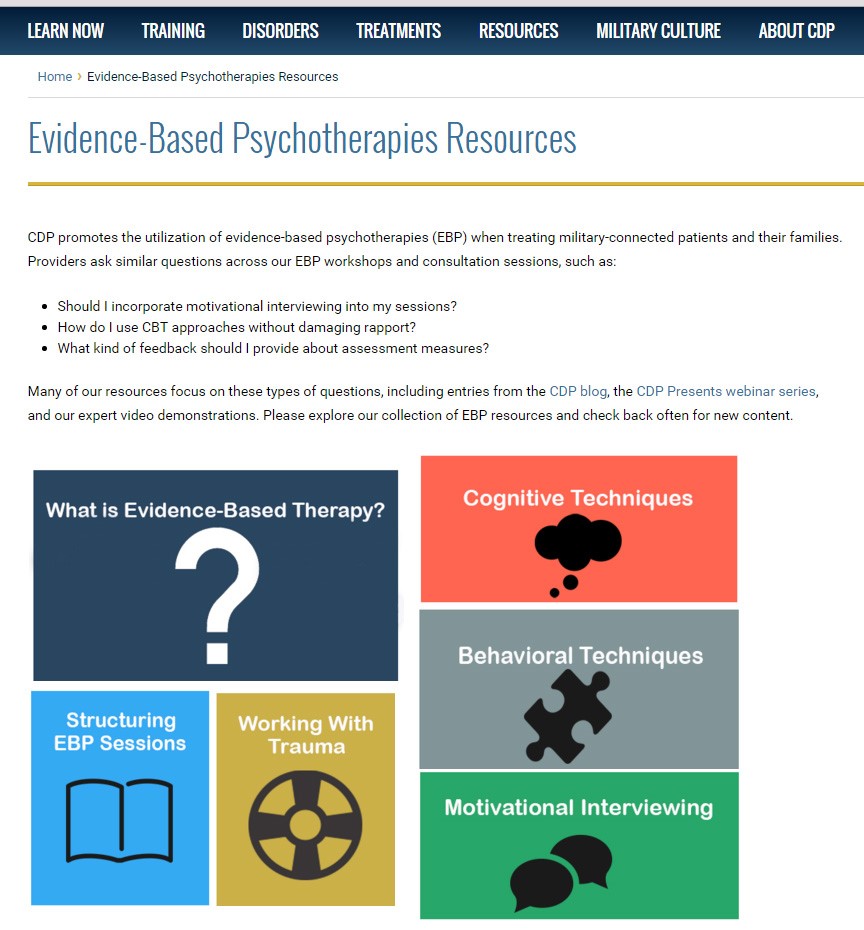Staff Perspective: New Evidence-Based Psychotherapies Resources Page
The Center for Deployment for Psychology is committed to helping behavioral health providers offer the latest in evidence-based psychotherapies (EBPs) when working with Veterans, Service members, and their families. As part of this commitment, CDP offers a variety of support, from live training, to consultation, to our monthly “CDP Presents” webinars. Now we’re proud to present our latest offering, the new Evidence-Based Psychotherapies Resources page on our website. Here providers can find a wide variety of resources to support their implementation and continuing usage of EBPs. The page answers many of the commonly asked questions that providers may have about EBPs.
The page is roughly broken up into the following six sections.
What is Evidence-Based Therapy
The resources on this page provide information about EBPs in general, as well as specific information about EBPs for PTSD, Major Depressive Disorder, and Insomnia Disorder.
Structuring EBP Sessions
One of the hallmarks of EBPs is session structure. The resources in this section will help providers effective structure the sessions. Structuring sessions makes efficient use of time, ensures that goals are addressed in each session, helps link sessions together, and instills hope that problems can be addressed in a systematic manner.
Working with Trauma
Here providers will find videos that demonstrate strategies that can be used to introduce EBPs to clients as well as interventions that can be used to identify an index trauma for clients with a history of multiple traumas. There are also links to other resources that will help keep their EBP skills sharp.
Cognitive Techniques
Providers will learn about Cognitive Techniques, which are a vital set of tools used in many EBPs. These techniques are designed to help patients identify, challenge and modify maladaptive thoughts, beliefs and images.
Behavioral Techniques
Behavioral techniques are a core component of many EBPs, including Prolonged Exposure, CBT for Insomnia, and CBT for Depression, just to name a few. These techniques have in common a focus on changing behaviors to improve mood and overall functioning.
Motivational Interviewing
Motivational Interviewing is a therapeutic approach intended to increase a patient's intrinsic motivation to make a behavior change. It does not replace an EBP, but rather serves as an adjunct to help a patient decide to engage in the EBP treatment and then to continue to enhance the patient's motivation.
Within these sections, providers will find a wealth of resources including documents, forms, handouts, blog entries, video examples of techniques and more. We invite you to explore this section and all of the content contained within. This section will continue to grow as we add more and more resources. If you have anything you’d like to see added, be sure and let us know and we’ll try to accommodate you!
The opinions in CDP Staff Perspective blogs are solely those of the author and do not necessarily reflect the opinion of the Uniformed Services University of the Health Science or the Department of Defense.
Chris A. Adams is the Online Services Project Manager for the Center for Deployment Psychology.
The Center for Deployment for Psychology is committed to helping behavioral health providers offer the latest in evidence-based psychotherapies (EBPs) when working with Veterans, Service members, and their families. As part of this commitment, CDP offers a variety of support, from live training, to consultation, to our monthly “CDP Presents” webinars. Now we’re proud to present our latest offering, the new Evidence-Based Psychotherapies Resources page on our website. Here providers can find a wide variety of resources to support their implementation and continuing usage of EBPs. The page answers many of the commonly asked questions that providers may have about EBPs.
The page is roughly broken up into the following six sections.
What is Evidence-Based Therapy
The resources on this page provide information about EBPs in general, as well as specific information about EBPs for PTSD, Major Depressive Disorder, and Insomnia Disorder.
Structuring EBP Sessions
One of the hallmarks of EBPs is session structure. The resources in this section will help providers effective structure the sessions. Structuring sessions makes efficient use of time, ensures that goals are addressed in each session, helps link sessions together, and instills hope that problems can be addressed in a systematic manner.
Working with Trauma
Here providers will find videos that demonstrate strategies that can be used to introduce EBPs to clients as well as interventions that can be used to identify an index trauma for clients with a history of multiple traumas. There are also links to other resources that will help keep their EBP skills sharp.
Cognitive Techniques
Providers will learn about Cognitive Techniques, which are a vital set of tools used in many EBPs. These techniques are designed to help patients identify, challenge and modify maladaptive thoughts, beliefs and images.
Behavioral Techniques
Behavioral techniques are a core component of many EBPs, including Prolonged Exposure, CBT for Insomnia, and CBT for Depression, just to name a few. These techniques have in common a focus on changing behaviors to improve mood and overall functioning.
Motivational Interviewing
Motivational Interviewing is a therapeutic approach intended to increase a patient's intrinsic motivation to make a behavior change. It does not replace an EBP, but rather serves as an adjunct to help a patient decide to engage in the EBP treatment and then to continue to enhance the patient's motivation.
Within these sections, providers will find a wealth of resources including documents, forms, handouts, blog entries, video examples of techniques and more. We invite you to explore this section and all of the content contained within. This section will continue to grow as we add more and more resources. If you have anything you’d like to see added, be sure and let us know and we’ll try to accommodate you!
The opinions in CDP Staff Perspective blogs are solely those of the author and do not necessarily reflect the opinion of the Uniformed Services University of the Health Science or the Department of Defense.
Chris A. Adams is the Online Services Project Manager for the Center for Deployment Psychology.


